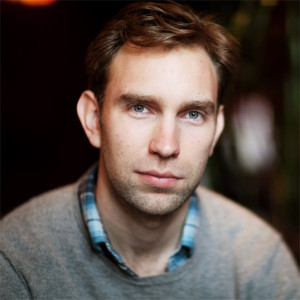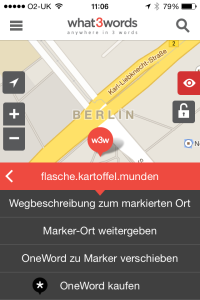Interview: Chris Sheldrick von what3words erklärt, warum er die Welt in 57 Billionen Quadrate einteilt.
von Christian Bach am 30.Juli 2014 in Interviews What3words teilt die Erde in Quadrate mit einer Größe von 3 Mal 3 Metern und jeweils drei Begriffen auf. Chris Sheldrick, der Mitgründer des britischen Startups, hat zehn Jahre im Event-Management der Musik-Branche gearbeitet. Immer wieder stieß er auf das Problem der genauen Positions-Angabe. Adressen und Koordinaten eröffnen bei der Weitergabe viele Fehlerquellen, wie Sheldrick weiß: „What3words ist ein universelles System für die gesamte Welt, bei dem man sich keine Gedanken über das System des jeweiligen Landes machen muss.“ Deshalb hat er den Globus in 57 Billionen Quadrate mit einer Größe von 9 Quadratmetern unterteilt. Jedes dieser Stücke ist durch eine einzigartige Kombination von drei Wörtern erkennbar. Erst im Mai wurde what3words in Deutschland gelauncht. Natürlich verwendet das Startup dafür deutsche Begriffe und achtet darauf, dass hierzulande einfache Wörter verwendet werden. „Schwere Kombinationen werden in entfernten Ländern genutzt, wie zum Beispiel in Peru. In spanisch-sprechenden Ländern wird dies genau umgekehrt praktiziert“, erklärt Sheldrick. Bereits im März hat what3words eine Finanzierung über 1 Mio Dollar erhalten. Mithilfe dieses Geldes arbeitet das UK-Startup an einem standortbasierten Spracherkennungs-System. Dieses soll die Ansage von den drei what3words-Begriffen erkennen, auch wenn diese nicht vollkommen korrekt ist. Dafür greift das System auf den Standort des Users zurück.
What3words teilt die Erde in Quadrate mit einer Größe von 3 Mal 3 Metern und jeweils drei Begriffen auf. Chris Sheldrick, der Mitgründer des britischen Startups, hat zehn Jahre im Event-Management der Musik-Branche gearbeitet. Immer wieder stieß er auf das Problem der genauen Positions-Angabe. Adressen und Koordinaten eröffnen bei der Weitergabe viele Fehlerquellen, wie Sheldrick weiß: „What3words ist ein universelles System für die gesamte Welt, bei dem man sich keine Gedanken über das System des jeweiligen Landes machen muss.“ Deshalb hat er den Globus in 57 Billionen Quadrate mit einer Größe von 9 Quadratmetern unterteilt. Jedes dieser Stücke ist durch eine einzigartige Kombination von drei Wörtern erkennbar. Erst im Mai wurde what3words in Deutschland gelauncht. Natürlich verwendet das Startup dafür deutsche Begriffe und achtet darauf, dass hierzulande einfache Wörter verwendet werden. „Schwere Kombinationen werden in entfernten Ländern genutzt, wie zum Beispiel in Peru. In spanisch-sprechenden Ländern wird dies genau umgekehrt praktiziert“, erklärt Sheldrick. Bereits im März hat what3words eine Finanzierung über 1 Mio Dollar erhalten. Mithilfe dieses Geldes arbeitet das UK-Startup an einem standortbasierten Spracherkennungs-System. Dieses soll die Ansage von den drei what3words-Begriffen erkennen, auch wenn diese nicht vollkommen korrekt ist. Dafür greift das System auf den Standort des Users zurück.
Location Insider: what3words user can buy a word for one specific position (OneWord). Do you own a position yourself? What is its name?
Chris Sheldrick: Every 3m x 3m square in the world has a 3-word address. Users can also buy a OneWord which is then an additional label to a square. Multiple users can buy different OneWords for the same square, so there is no sense of ownership of a square, just a OneWord. e.g. if you buy *matthew then nobody else can buy *matthew. A user can move their OneWord at any time.
 Location Insider: How did you come up with the idea of what3words? Are coordinates too difficult?
Location Insider: How did you come up with the idea of what3words? Are coordinates too difficult?
Chris Sheldrick: I was working in the music/events business and to define the locations where people had to enter a site, we abandoned addresses and postcodes in favour of coordinates which were much more precise. However, people are very resistant to coordinates, they are very prone to human error, difficult to remember, and not really feasible for communication between people in person or in phone calls. What3words was built based around solving all of these problems.
Location Insider: What3words launched about two months ago in Germany. How do you transfer the logic of your service into other languages („Just“ by translating?)?
Chris Sheldrick: We don’t translate the words, they are totally different words. Because we will have more German users in Germany, we give shorter, more common German word combinations assigned to 3m squares in Germany, and less good German word combinations in Peru (for example). However in our 3 Spanish words version it would be the opposite.
Location Insider: What specific value does what3words provide?
Chris Sheldrick: It provides you a way of remembering and communicating precise location simply, whether it be by text, voice, or email. It’s also one universal system across the whole world, you don’t have to worry about the problems of individual countries’ address systems as you travel.
Location Insider: You Added 1 million Dollar more to your seed in March. What did/do you do with that money?
Chris Sheldrick: We are developing a voice system which not only works out what the user has said, but intelligently guesses your desired location very well if the voice engine is unsure what you said (a common problem associated with voice recognition). knife.fork.spoon is in north west London, but knife.fork.spoons is in southern Russia. If you are standing in London when you say these 3 words, we’ll assume you probably wanted the London one. In reality we’ll check a thousand or so locations each time to improve the voice accuracy to near 100% – this technology is of great interest to our partners.
Location Insider: What are your goals with what3words this year? Do you want to expand to other countries?
Chris Sheldrick: More partner apps and websites accepting what3words input and more 3 word languages for consumers to use.
Location Insider: Thank you very much for the interview.
Weitere spannende Interviews zu Location-based Services:
- Interview: Candylabs-CEO Daniel Putsche stellt iBeacon-App mit Gamification-Ansatz vor.
- Interview: Bernhard Webler von MicroStrategy will Mobile Payment in das eigene Ladenmanagement-Konzept bringen.
- Interview: Katharina Schultz von meinestadt.de will Native Advertising und Mobile ausweiten.
Newsletter abonnieren
Abonnieren Sie den kostenlosen Newsletter von Location Insider. Wir liefern darin täglich gegen 11 Uhr business-relevante Hintergründe zur Digitalisierung des Handels.



